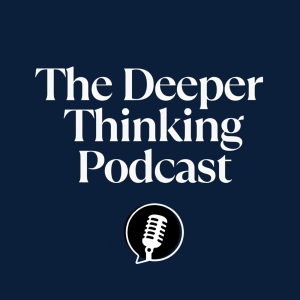
Monday Apr 14, 2025
The Divergent Mind: Reframing ADHD =- The Deeper Thinking Podcast
The Divergent Mind: Reframing ADHD
For those who have never quite fit the frame—and those learning to honor that as a form of knowing.
What if ADHD isn’t a disorder, but a divergent pattern of attention shaped by relational intelligence, rhythmic perception, and ethical sensitivity? In this extended episode, we reimagine ADHD not as a clinical failure but as a philosophical lens—one that refracts the pace, priorities, and punitive designs of the dominant world.
Rather than seeing ADHD as an attention deficit, we explore it as a time-based difference. Russell Barkley frames it as a struggle with internal time management. Gabor Maté connects it to relational wounding. We bring in Bessel van der Kolk and Stephen Porges on trauma and the polyvagal system, and Bonnie Badenoch and Pat Ogden on somatic processing and regulation.
From Devon Price’s critique of productivity myths to Tricia Hersey’s rest-based justice, and Saidiya Hartman’s notion of errant movement, we reflect on how refusal, stillness, and shame alchemize into new maps of self. Lauren Berlant and Silvia Federici remind us that bodies out of sync with capital are not broken—they’re prophetic.
This is not a diagnostic guide. It’s a meditation on rhythm, relationality, and redesigning our worlds to honor minds that don’t flatten to fit. It asks not “How do we fix ADHD?” but “What might a society look like if it made room for it?”
Reflections
Some of the questions that surfaced along the way:
- What if hyperactivity is a form of embodied intelligence, not dysfunction?
- What does it mean to be “on time” in a culture that ignores relational pace?
- Why are minds that resist linearity framed as deviant, rather than deep?
- Can shame be unlearned not through correction, but through co-regulation?
- How do we reconfigure environments—not people—to support neurodivergence?
- When the body leads, what does learning become?
- What would it mean to honor emotional sequencing as intelligence?
Why Listen?
- Reimagine ADHD through somatic, philosophical, and trauma-informed lenses
- Explore rhythm, relational presence, and emotional regulation as intelligence
- Learn from voices at the intersection of neuroscience, justice, and embodiment
- Move beyond symptom to soul—rethinking design, depth, and dignity
Listen On:
Support This Work
If you'd like to support the ongoing work, you can visit buymeacoffee.com/thedeeperthinkingpodcast or leave a kind review on Apple Podcasts.
Bibliography
- Maté, Gabor. Scattered Minds. New York: Avery, 2023.
- van der Kolk, Bessel. The Body Keeps the Score. New York: Penguin, 2014.
- Hersey, Tricia. Rest Is Resistance. New York: Little, Brown, 2022.
- Price, Devon. Laziness Does Not Exist. New York: Atria Books, 2021.
- Badenoch, Bonnie. The Heart of Trauma. New York: Norton, 2017.
- Federici, Silvia. Caliban and the Witch. New York: Autonomedia, 2004.
- Berlant, Lauren. Cruel Optimism. Durham: Duke University Press, 2011.
- Ogden, Pat. Sensorimotor Psychotherapy. New York: Norton, 2006.
- Porges, Stephen. The Pocket Guide to the Polyvagal Theory. New York: Norton, 2017.
- Hartman, Saidiya. Wayward Lives, Beautiful Experiments. New York: Norton, 2019.
Bibliography Relevance
- Gabor Maté: Reframes ADHD as a relational and developmental response rather than a disorder.
- Bessel van der Kolk: Explores how trauma is held in the body, informing a somatic approach to attention and regulation.
- Tricia Hersey: Positions rest as a radical, justice-driven reorientation to productivity and worth.
- Devon Price: Challenges internalized productivity myths and reframes laziness as resistance.
- Bonnie Badenoch: Provides a deeply relational, right-hemisphere-informed view of trauma integration.
- Silvia Federici: Contextualizes attention and regulation within broader histories of discipline and extraction.
- Lauren Berlant: Examines the affective structures that shape how we endure and interpret chronic overwhelm.
- Pat Ogden: Introduces sensorimotor techniques for engaging with trauma held below verbal awareness.
- Stephen Porges: Offers polyvagal theory as a physiological framework for safety, attention, and co-regulation.
- Saidiya Hartman: Illuminates how errant forms of life resist normative containment and redefine relational space.
To be divergent is not to be broken. It is to be carrying a rhythm the world has yet to hear.
#ADHD #Neurodiversity #GaborMaté #StephenPorges #TriciaHersey #SomaticPsychology #Attention #Listening #SilviaFederici #LaurenBerlant #BesselVanDerKolk #DevonPrice #TheDeeperThinkingPodcast #Rest #Rhythm #Embodiment
No comments yet. Be the first to say something!